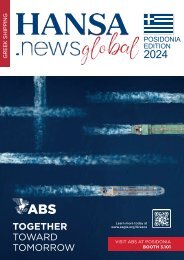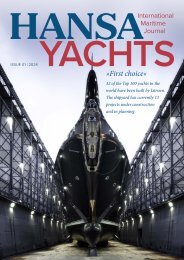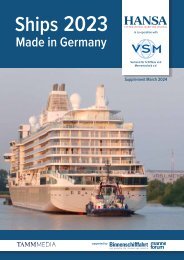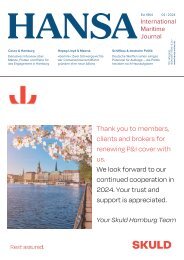HANSA 02-2023
WISTA Germany · Ship Efficiency · CII · Weather Routing · Neubau »Coriolis« · Future Fuels · Klima-Risiko in Häfen · Brandschutz · Hydropen · MPP-Flotte · Deck Carrier · Shortsea-Schifffahrt
WISTA Germany · Ship Efficiency · CII · Weather Routing · Neubau »Coriolis« · Future Fuels · Klima-Risiko in Häfen · Brandschutz · Hydropen · MPP-Flotte · Deck Carrier · Shortsea-Schifffahrt
Sie wollen auch ein ePaper? Erhöhen Sie die Reichweite Ihrer Titel.
YUMPU macht aus Druck-PDFs automatisch weboptimierte ePaper, die Google liebt.
SCHIFFFAHRT | SHIPPING<br />
Fire and explosion incidents cause the<br />
most expensive insurance claims in<br />
the marine industry, while at a time of rising<br />
exposures and inflation, cargo damage<br />
is the most frequent cause of loss,<br />
according to the recently published report<br />
of Allianz Global Corporate & Specialty<br />
(AGCS). The marine and cargo insurer<br />
analyzed more than 240,000 marine insurance<br />
industry claims worldwide between<br />
January 2017 and December 2<strong>02</strong>1,<br />
worth approximately 9.2 bn € in value.<br />
»The number of fires on board large<br />
vessels has increased significantly in recent<br />
years, with a string of incidents involving<br />
cargo, which can easily lead to the<br />
total loss of a vessel or environmental<br />
damage,« said<br />
Régis Broudin, Global<br />
Head of Marine Claims at<br />
AGCS.<br />
Fires accounted for 18 %<br />
of the value of marine<br />
claims analyzed (equivalent<br />
to around 1.65 bn €)<br />
compared with 13 % for a<br />
five-year period ending<br />
July 2018. A contributing<br />
factor to this increase of<br />
fire risk on board vessels is often misdeclared/non-declaration<br />
(of) dangerous<br />
cargos, while a recent increase in engine<br />
room fires may reveal some underlying<br />
risk around crew competencies. The potential<br />
dangers that the transportation of<br />
lithium-ion batteries on vessels pose only<br />
add to these concerns, with AGCS having<br />
already seen a number of incidents.<br />
The development is causing more and<br />
more anger and incomprehension in the<br />
insurance industry. For some time now,<br />
there have been various attempts to improve<br />
the safety framework conditions in<br />
shipping. Towards the end of last year, the<br />
TT Club finally made a new push. TT<br />
Club is an independent provider of mutual<br />
insurance and related risk management<br />
services to the international transport<br />
and logistics industry. Founded in<br />
1968, the Club has more than 1,100<br />
Members, spanning container owners<br />
and operators, ports and terminals, and<br />
logistics companies, working across<br />
maritime, road, rail, and air.<br />
In a message to the market, it says »TT<br />
Club is continuing its battle to convince<br />
cargo interests, supply chain professionals<br />
and enforcement agencies that<br />
the responsibility for mitigating container<br />
ship fires is shared by numerous<br />
entities involved from end to end of the<br />
entire global supply chain.« With its estimated<br />
sixty-day average occurrence of<br />
serious fires being maintained by the<br />
»Zim Charleston« fire in August and the<br />
»TSS Pearl« in the Red Sea in early October,<br />
TT urged a more comprehensive<br />
approach to arresting the trend.<br />
»There were significant lessons coming<br />
from the sad incident on the ›MSC Flaminia‹,<br />
which cost the lives of three seafarers,<br />
particularly from the subsequent<br />
legal proceedings that adjudged the<br />
shipper and NVOC responsible for root<br />
cause errors,« said TT’s Peregrine Storrs-<br />
Fox. »Despite the biennial updates to the<br />
IMDG Code, including multiple arising<br />
»We are continuing our battle to convince cargo<br />
interests, supply chain professionals and enforcement<br />
agencies that the responsibility for mitigating container<br />
ship fires is shared by numerous entities involved from<br />
end to end of the entire supply chain«<br />
Statement of TT Club<br />
from this particular incident, the judge’s<br />
assessment that the regulations merely<br />
set the ›baseline‹ for good practice remains<br />
utterly true today.«<br />
According to the TT Club, ensuring<br />
compliance with the latest mandatorily<br />
applicable version of the IMDG Code is<br />
essential as a minimum standard for all<br />
those shipping dangerous goods by sea.<br />
But the liability judgement in the »MSC<br />
Flaminia« case made it clear that regulations<br />
merely set the baseline. »This is an<br />
important statement to which any entity<br />
inclined to rely solely on the letter of the<br />
law when consigning dangerous goods,<br />
would do very well to pay heed,« commented<br />
Storrs-Fox.<br />
TT advocates a comprehensive approach,<br />
striving to bring an understanding<br />
of all the factors contributing to<br />
these fires to everyone involved in the<br />
movement of cargo in containers and<br />
therefore underlining their responsibilities<br />
for safety.<br />
Errors, misunderstandings, misdeclarations<br />
and inadequate packing and<br />
securing are described as lying at the<br />
heart of many significant incidents, both<br />
at sea and in storage facilities.<br />
Movement of<br />
cargo is initiated in the<br />
trading of goods – sellers<br />
and buyers – who instruct<br />
packers and<br />
whoever becomes the<br />
shipper. »They have a<br />
duty of care as much as<br />
the packers, warehouse<br />
operators, forwarders,<br />
logistics companies, carriers<br />
of all modal types,<br />
cargo handlers and terminal operators.<br />
Attention to accurate classification and<br />
declaration are critical to improve certainty<br />
of outcome from end to end. This<br />
requires truth as much as awareness of<br />
regulations and sound safety practices.«<br />
Along with its sister insurer, the UK<br />
P&I Club, TT Club has recently updated<br />
its guideline publication, »Book it Right,<br />
Pack it Tight«. It is intended to provide<br />
key insights for all involved in dangerous<br />
goods’ shipments, including a clear ex-<br />
Top causes of loss by value of claims in marine<br />
© AGCS<br />
<strong>HANSA</strong> – International Maritime Journal <strong>02</strong> | 2<strong>02</strong>3<br />
29


















